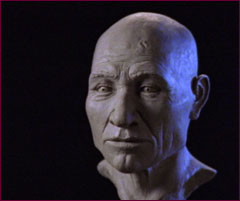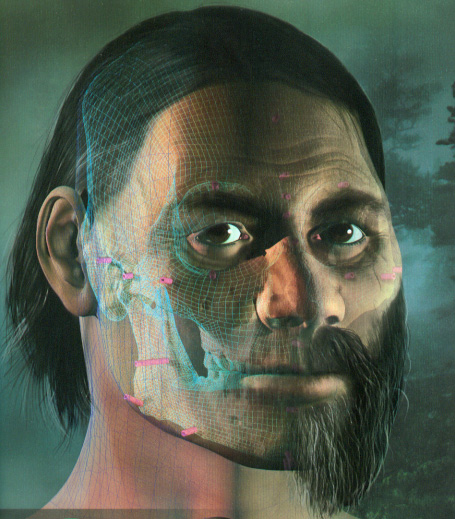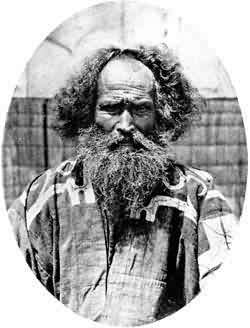
Indigenous Peoples and Archaeology: From Conflict to Coalition. Anth 3510, Sept - Dec 2005. Dr. Kathryn Denning
14 Nov 2005
Back to main 3510 page.
Plan for the day
1 Announcements/ organizational stuff, attendance.
2 Repatriation - lecture / discussion
3 Film: Who Owns the Past? York vid 0209
Announcements:
Class on November 28 (poster party day!) will be in Curtis 110. (If walking from our usual room in Bethune, turn right into Curtis before the red & white fire hydrant. Enter Curtis, and turn left immediately. The room is right there.) Try to be there right at 11:30, please, so we can get set up quickly.
Remaining readings are all available outside my office (Vari 2029) and have also been posted in pdf form to this website (here).
Back to last week... the G’Psgolox Pole
Preliminary: thinking about attitudes towards the dead.
Consider: is the "scientific attitude" towards the dead culturally neutral? Or does it stem from a specific cultural background? Is it something that should be considered as a neutral default option?
Consider also the history of medicine and its relationship to anatomical studies.
Vermilion Accord
1.Respect for the mortal remains of the dead
shall be accorded to all, irrespective of origin, race, religion, nationality,
custom and tradition.
2.Respect for the wishes of the dead concerning disposition shall be accorded
whenever possible, reasonable and lawful, when they are known or can be
reasonably inferred.
3.Respect for the wishes of the local community and of relatives or guardians of
the dead shall be accorded whenever possible, reasonable and lawful.
4.Respect for the scientific research value of skeletal, mummified and other
human remains (including fossil hominids) shall be accorded
when such value is
demonstrated to exist.
5. Agreement on the disposition of fossil, skeletal, mummified and other remains
shall be reached by negotiation on the basis of mutual respect for the
legitimate concerns of communities for the proper disposition of their
ancestors, as well as the
legitimate concerns of science and education.
6.The express recognition that the concerns of various ethnic groups, as well as
those of science are legitimate and to be respected, will permit acceptable
agreements to be reached and honoured.
Video and discussion regarding repatriation
The Case of "Kennewick Man"


Above: will the real Kennewick Man please stand up?
Who do you think should have custody of the Kennewick remains, and why?
What should be done with the Kennewick remains: Should archaeologists and other scientists be entitled to study them, or should they be reburied, or some combination of the two?
Was the Kennewick case handled properly? Why or why not? If you think not, then can you recommend another procedure?
SOME ISSUES regarding the Kennewick Case
Naming - what do we call him? (Why should he be known by "Kennewick Man" rather than by the Native name for him?
Who are the parties involved in the Kennewick case?
Archaeologists for study without permission - in the minority.
Archaeologists for collaboration
Archaeologists for repatriation
Other scientists
Umatilla confederacy - asking for straight repatriation (but within
that confederacy of five groups - there will be differences of opinion)
Native people who would like it to be studied
Museum personnel
Army
Multiple levels of government - federal, state, municipal
Media - multiple levels
Asatru Folk Assembly - another religious community; but brings up the
religious affiliation question ('Original Viking Settlers of North America")
Polynesian man also launched claim.
WEIGHING RIGHTS
- rights of the individual vs. the collective, and the rights of the minority vs. the majority, and the rights of specific groups over the general collective (arch as a universal human resource) - rights are ascribed and vary from culture to culture and time to time. Intractable question - how do you determine affiliation without study? But how do you study if it's sacrilege? Reconstruction
Below: From Skull Wars, David Hurst Thomas
Chatters' reconstruction... looks European
Above: Or does Kennewick Man look more like Chief Black Hawk, as Deloria suggest?
Or should Kennewick Man be reconstructed with Ainu features?
From National Geographic, December 2000.

Who are the Ainu?

Ainu, indigenous people of Northern Japan - language isolate, earlier population, traditional lifestyle was hunting/fishing/gathering. DNA shows may be descendants of ancient Jomon population (13 000 BC to 300 BC).
Became minorities after invasion of people now known as
ethnic Japanese,
especially from the 1400s onward. Like Native people in North America, the Ainu
are having to work hard to maintain
cultural rights and also to get skeletons repatriated from Japanese universities
Moral of the story with reconstructions:
- they are subjective
- they are easily manipulated by the media and others
- they are of little scientific value
- there is no neutral way to do them (pale clay with no hair does not 'read' as
ethnically neutral!)
- they can be adjusted to fit different scientific theories
The matter of skull shape and what it means.
- very little!
- it can be used to learn about populations but
this is tremendously difficult when we're looking at it over long periods of
time.
- skull shape is determined not only by genetics but also by environment during
the lifetime
Historical notes
- recall the work of Samuel Morton, who was
focusing on cranial capacity as a measure of intelligence and managed to 'prove'
racial differences in brain size etc.... but who was very much mistaken (see
Stephen Jay Gould, Mismeasure of Man)
- ultimately this was disproven by later anthropologists, and also the subject of skull shape was shown to be complicated and not a simple racial indicator or indicator of intelligence.
- but it's a terrible irony that as part of the endeavour to learn more about skulls, early anthropologists (like Boas) in the 1800s and early 1900s were part of skull collecting expeditions that are horrifying by modern standards -- taking heads and bodies from very recent Native burials as though it was simply essential scientific work. n.b. Boas eventually proved that Natives were not inferior, on the basis of these studies. But that does not justify the means.
However, bear in mind though that digging up recent graveyards of poor people of all ethnicities was standard practice for medical students in the 1700s and into the 1800s too.
Bottom Line with the Kennewick Case
- it's tremendously compounded by politics, by long-term conflicts between groups, by long-term oppression of Native peoples, by racism (both institutionalized and also smaller elements in society, e.g. white supremacists)
- it's made difficult by the legal implications with respect to land claims; in some places, demonstrating long-term occupation of an area has consequences for present-day people
- and it's made difficult by the fact that some
people appear not to understand that studying skulls is not a neutral activity
that everyone supports! What should be the default option? Study isn't a neutral default.
Museum custody isn't a neutral default. (Is there any neutral use of the past?)
Archaeology isn't neutral either. (what agendas does archaeology serve? what
lenses does it see through? what historical baggage does it carry?)
- it's made difficult by lack of historical
cooperation. c.f.
Kwaday dan Sinchi case, in BC, in which there was
a good precedent for conversation and cooperation
- it's made difficult by the fact that
scientists/ archaeologists lose control over media understandings
- we must always consider what knowledge is worth in terms of human suffering (Just how much can you learn from one set of ancient human remains? Sex, age, etc…. injuries, diet, lifeway…. biological population affiliation - WHAT IS THAT KNOWLEDGE WORTH?)
- we must always realize that there is a
divide between subject and object -- what does it do to make people into
objects?
- Heritage of all humanity? Kennewick belongs to all of us? Chatters' opinion, and e.g. opinion here: http://seattletimes.nwsource.com/html/editorialsopinion/2001852530_maned07.html